Falling, metaphorically
How practicing falling can help you feel safe even when you are not in control.
A quick reminder: Looking for a supportive, encouraging, LGBTQ-friendly space to get some writing started? I’m teaching a 4-week online writing class starting April 16. I’d love for you to join if you’re interested. Sign up now to get the best early bird rate: $80. Check out all the details here.
In my last post, I talked about the physicality of falling down in martial arts, an activity that I’ve learned to do over and over without getting hurt.
My readers shared in the comments what this meant to them: primarily, falling as metaphor.
commented:It makes me think...
Falling in love
Falling for a good (or bad) joke
Falling out of grace
Falling for comedy
Falling into someone's arms
We fall all the time, metaphorically and literally, and the practice of falling is often contrary to the violence we ascribe it.
(You should check out Robin’s publication, Trans Friend, for excellent cultural commentary and storytelling.)
When I think of falling, I think of hitting the mat. I’m such a literal person sometimes. But I find it fascinating to consider all these non-literal falling-related expressions.
Many of these are overwhelmingly positive (falling in love, falling into someone’s arms). The benefit of being able to let go, to relinquish control, to trust that someone else will catch you, is a way to form a connection through falling. Even if it’s you catching yourself (or rolling safely).
Falling represents losing control. Practicing falling can be a way to feel safe during situations where you are not in control. I think it can help to understand you can still take care of yourself when a situation is out of your hands.
Publishing writing is often out of our control. You have full control over an essay draft, until you send it to an editor who rewrites it for you. You can’t control if your pitches are accepted or if an agent wants to represent you. So, what if you decide to self-publish? Still not in complete control, I’m sorry—you can’t control the reaction of the public to your work or whether they decide to read or not.
Relationships are another huge area where we’re not in control of another person’s opinions or emotions. It can be freeing to realize we’re responsible for our own respectful and supportive behavior towards a partner, but not responsible for their mental state. But giving up that illusion of control can jolt your stomach as if you tripped and stumbled towards the ground.
Coming out can be very out of our control. Especially if someone else outs you, it can be incredibly painful and isolating to deal with a family’s or community’s reaction. I was scared to come out as a non-binary person using they/them pronouns at work. Although people said supportive things, I also had to endure awkward apologies for referring to me incorrectly and questions about whether I would be comfortable working with international folks. (I had a great time working with our engineers outside the US, and yes, I could still do my job well even if I’m out as non-binary.)
What these situations all have in common is that you can’t control someone else’s response. It can be tempting to contain your opinions and identity inside. This is a people-pleasing reaction, to try to be the person everyone wants you to be. This can feel safer, at least at the moment. Keeping yourself safe can be very important. But in the long term, many people find they cannot be all things to all people.
People-pleasing, or fawning, is a trauma response. I believe learning to express more of your true self, scary as that might be, is a good way to heal from trauma and feel more embodied and whole.
And our business selves are not separate creatures from our personal selves. Most creative ventures, whether it is publishing a newsletter, teaching a class, writing a book, or running a small business, depend heavily on other people (your clients) who you have no control over. That lack of control and predictability is the hardest part of working directly for other people without a corporation as a buffer, for me.
I still get scared when I fall, sometimes. If my partner picks me up with ogoshi, a judo throw we don’t practice that often, my stomach always drops into my guts while I’m in the air. But I am more proud of being able to handle that throw than I am uncomfortable during it. It’s not a bad thing to feel myself losing control of where my body and mind are. I’m pleased that I’ve learned to lean into doing something hard.
Every fall that I take in the safe environment of the dojo helps me condition my mind to reacting in safer ways if I fall off my bike, or get rejected by an editor, or hear crickets after launching what I think is a new and exciting offering. The more I fall comfortably on the mat, the more I fall comfortably into intimidating business ventures, friendships & relationships, and the more success I have forming connections with others.
Success comes easier through practice falling over and over and over.
Thanks so much for reading! Let me know what you think in the comments.
Do you need digital marketing assistance? I can help with graphics, websites, search, newsletters, videos, and more. Learn more and book a free discovery call at weshineconsulting.com! Or just hit reply and tell me about your digital marketing problem. Let’s get the message out about your great work!
“Amazing. Rey quickly and efficiently put together social media images for me and did an information audit of my website. I’ve loved working with Rey.” —Joanna
Check out my videos on YouTube!
Take care,
Rey











Glad to see you following this thread. And now I’ve also been thinking of writing my own metaphorical ukemi post!
“ whether I would be comfortable working with international folks..”
This is such a dumb question, whomever said this. Yes, because non-Americans are more discriminatory and/or have never heard of such things? More like the opposite, on the average, particularly anyone who is in such an engineering position in the first place..just shows a real ignorance about the world on the part of your interlocutor.
This felt like that delicious moment at the end of a good yoga practice where I get to lay down on the floor and relish falling, relaxing, and letting go. Really brilliant and lovely writing, Rey.